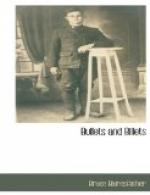Not a soul about anywhere. Wulverghem lay there, empty, wrecked and deserted. I walked along the river bank for a bit, and had got about two hundred yards from the farm when the quiet morning was interrupted in the usual way, by shelling. Deep-toned, earth-shaking crashes broke into the quiet peaceful air. “Just in the same place,” I observed to myself as I walked along behind our left-hand trenches. I could see the cloud of black smoke after each one landed, and knew exactly where they were. “Just in the same old—hullo! hullo!” With that rotating, gurgling whistle a big one had just sailed over and landed about fifty yards from our farm! I nipped in across the moat, through the courtyard, and explained to the others where it had landed. We all remained silent, waiting for the next. Here it came, gurgling along through the air; a pause, then “Crumph!”—nearly in the same place again, but, if anything, nearer the next farm. The Colonel moved to the window and looked out. “They’re after that farm,” he said, as he turned away slowly and struck a match by the fireplace to light his pipe with. About half a dozen shells whizzed along in close succession, and about four hit and went into the roof of the next farm.
Presently I looked out of the window again, and saw a lot of our men moving out of the farm and across the road into the field beyond. There was a reserve trench here, so they went into it. I looked again, and soon saw the reason. Dense columns of smoke were coming out of the straw roof, and soon the whole place was a blazing ruin. Nobody in the least perturbed; we all turned away from the window and wondered how soon they’d “have our farm.”
CHAPTER XXIV
THAT RATION FATIGUE——SKETCHES IN
REQUEST—BAILLEUL—BATHS AND
LUNATICS—HOW TO CONDUCT A WAR
[Illustration: T]
They seemed to me long, dark, dismal days, those days spent in the Douve trenches; longer, darker and more dismal than the Plugstreet ones. Night after night I crossed the dreary mud flat, passed the same old wretched farms, and went on with the same old trench routine. We all considered the trenches a pretty rotten outfit; but every one was fully prepared to accept far rottener things than that. There was never the least sign of flagging determination in any man there, and I am sure you could say the same of the whole front.
And, really, some jobs on some nights wanted a lot of beating for undesirability. Take the ration party’s job, for instance. Think of the rottenest, wettest, windiest winter’s night you can remember, and add to it this bleak, muddy, war-worn plain with its ruined farms and shell-torn lonely road. Then think of men, leaving the trenches at dusk, going back about a mile and a half, and bringing sundry large and heavy boxes up to the trenches, pausing now and again for a rest, and ignoring the intermittent crackling of rifle fire in the darkness, and the sharp




